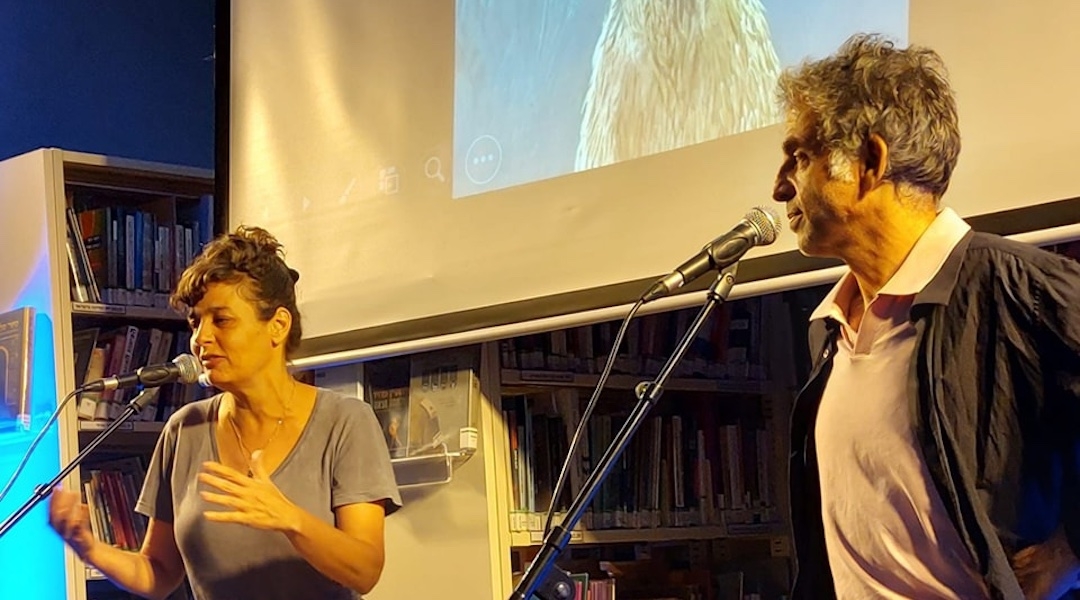A Response to Noah Feldman
Dear Prof. Feldman,
My first — and last — impression after reading your extremely well-written New York Times Magazine essay (more properly — a manifesto) is one of sympathy for your predicament, respect for your honesty and profound sadness at the community’s misfortune when one of our best and most well-known yeshiva day school graduates sees nothing wrong with “marrying out.” Worse: You wittingly or unwittingly exposed your coreligionists to opprobrium in arguably the world’s most public forum — even as you express admiration for the Jewish tradition, especially for Modern Orthodoxy.
True, we no longer “sit shivah” for a relative who married out. But all of us experience poignant anguish when a brilliant and once fully committed son of our people, who earnestly believes he is not rejecting his upbringing, effectively does just that in justifying his transgression and holding us up to ridicule.
And why so? Because you violated a major principle of Judaism and yet object when we, your fellow Jews, express our heartache in one of the only ways open to us.
Quite simply, my dear Prof. Feldman, you want to have your cake and eat it too. Sorry, but that just can’t be done.
Frankly, your resentment at the removal of your name and photo from the alumni list of your high school and other such petty discourtesies does not elicit much sympathy from me. Tantrums do not move me. I am moved by your resolve to continue your relationship to Judaism. And I value your suggestion that we reexamine our attitude to the social ostracism we have practiced heretofore. We certainly will not accept the violation of the law with equanimity, but we ought to rethink how we can express our displeasure in a manner that will not close the doors to teshuva — if indeed the couple wishes to take advantage of it.
Apparently, you take the matter of intermarriage lightly — something on the line of eating non-glatt-kosher meat. If so, you are sorely mistaken. True, one can make a case that out-marriage is, technically, not a more serious violation than work on Shabbat or eating on Yom Kippur. But you well know that in our times the ultimate sign of pending assimilation is intermarriage. You resent the small discourtesies you experienced, yet you ignore the massive insult to your alma mater, and to the Modern Orthodox community that nourished you all these years, by violating a fundamental law — and then punish them in public.
Prof. Feldman, I do not understand you. I am truly nonplussed. Once or twice in your article you imply that Judaism should tolerate a forbidden marriage because it is “one of my most important life decisions.” I cannot believe that you really want to exempt the “most important of life’s choices” from the purview and judgment of religion. For Heaven’s sake, do you prefer that religion — any religion — deal with any thing but that which is important in life? Is this the Judaism you want? One that will make you feel warm and fuzzy and cuddly, one that will make grandiloquent pronouncements and issue pretty pieties — anything but what is really an “important life decision”?
That is not the kind of religion for which our ancestors — yours and mine — were willing to suffer abuse unto martyrdom.
Let me now address several other (but not all of the) important items in your essay.
You imply that Modern Orthodoxy is somehow responsible for Baruch Goldstein and Yigal Amir. That is a blatant example of guilt by association, and truly a low blow that is unworthy of you. If Modern Orthodoxy is responsible for Goldstein and Amir, then Harvard is responsible for the Unabomber; Yale must answer for some of the most implacable kooks in this country — both right- and left-wingers, and by the same token Maimonides School is responsible for the tergiversation of one of its most distinguished graduates.
Now, for the facts: You do not quote any source for your assertion that when Baruch Goldstein murdered Arabs at prayer in Hebron on Purim day, he did so because he considered the Palestinians as Amalekites.
I beg to differ. His act was not one commanded by his religion, but by his Kahanist politics. How do I know? Because several years before the Hebron massacre, I received a document in which Palestinians of that area were effusive in their praise for the two brothers Goldstein, both physicians, who treated them with the same professionalism and compassion that they did their fellow Jews.
So your premise is faulty, and your conclusion is wrong.
Next item: You refer in anger to the Talmudic view on whether a Jewish doctor may violate the Sabbath laws in order to save the life of a non-Jew. You are critical of the Sages of the Talmud who permitted such violations of laws of the Sabbath because of concern for maintaining peaceful relations between the Jewish and non-Jewish communities. You suggest that, on the one hand, it is an “instance of laudable universalism,” but, on the other, it is “an example of outrageously particularist religious thinking.”
Surely you, as a distinguished academic lawyer, must have come across instances in which a precedent that was once valid has, in the course of time, proved morally objectionable, as a result of which it was amended, so that the law remains “on the books” as a juridical foundation, while it becomes effectively inoperative through legal analysis and moral argument. Why, then, can you not be as generous to Jewish law, and appreciate that certain biblical laws are unenforceable in practical terms, because all legal systems — including Jewish law — do not simply dump their axiomatic bases but develop them. Why not admire scholars of Jewish law who use various legal technicalities to preserve the text of the original law in its essence, and yet make sure that appropriate changes would be made in accordance with new moral sensitivities? Plato — as well as Maimonides — taught us that every law must leave some who are thereby disadvantaged, that it is in the nature of law to serve the community even when individuals are injured. We then must seek ways to ameliorate the situation as best we can. This is a legitimate way for the Talmudic and post-Talmudic rabbis to protect the sacred Shabbat laws, and by appropriate halachic legislation enable us to live without violating our moral conscience.
Let me clarify my stand, as an Orthodox rabbi, on the issue you raised: It is strictly forbidden by the Halacha to deny a non-Jew whatever is necessary to save his or her life. There must be no discrimination whatsoever. Every human being is created in the Image of God and has a right to life and health. “The Lord is good to all and His tender mercies are over all His works” (Psalm 145).
Because the issue is subtle and highly sensitive, do you not think that it would have been more responsible of you either not to mention an issue which for centuries has inflamed antisemitic vindictiveness and exacerbated irritation for those Jews ignorant of the method and subtleties of the law, especially since such subtleties are beyond the reader not trained in legal theory? But if you are compelled to write about it, would it have been a violation of some professional code to give precedence and preference to the universalist bias of the halachic tradition?
But you took the easy way out, and thereby succeeded in holding up the Torah, the Talmud, the rabbis and especially Modern Orthodox Judaism to public ridicule, making the whole Talmudic enterprise look bigoted and racist.
Bravo! You made a trenchant point and, by the way, you succeeded in supplying via the New York Times article enough anti-Jewish material to last a good few years — as antisemites have been spewing this sanctimonious poison for centuries. Did not this possibility occur to you when you were writing your article? Why the sudden collapse of your obvious sophistication? “Sages,” the Talmud declared, “be exceedingly careful with your words.”
You apparently were equally unaware of the damage your words have caused to innocent bystanders. Example: Daniel ___|__, a recent graduate of Yeshiva University, wrote this letter to me that broke my heart:
Like most Yeshiva University graduates, I interact on a daily basis with gentiles for most of my day. My Orthodox Jewish identity has never become an issue or conflict. However, following last week’s New York Times article by Noah Feldman… I have frequently been getting questions like, ‘Is it true that according to your law you wouldn’t save my life on the Sabbath’ or, ‘Do you really believe that Jewish life is more important than gentile life?’ How does a young Modern Orthodox professional answer these questions in a respectful and diplomatic way so as not to demonize others and at the same time be true to his faith?
My dear Noah Feldman, it is your duty to answer him, because you are the cause of his discomfiture and perhaps his possible inability to find employment — and so for the thousands who have no access to the pages of The New York Times and who will have to live under the cloud of calumny you have unwittingly visited upon them. Of course, I don’t think you will, but should you be moved by Daniel’s predicament, call me and I will gladly give you his full name and address. You owe it to him.
If my words sound harsh, it is because I have followed your career with naches and hope for the future of our Jewish people and Modern Orthodoxy, so I write like a spurned lover. I sympathize with your dilemmas. I can appreciate the pain suffered by one subject to the social sanctions prescribed by Jewish tradition, and I can understand the feelings of one who, under the pressure of desire or love, feels compelled to ignore the biblical prohibitions. The flesh, after all, is weak. But that is no excuse for embarrassing a whole community to which you always belonged and to which you maintain you still owe a degree of fidelity (and I believe you).
In your essay, your closing words are, “My best friend just laughed.”
As for me — I cried.
I still dream that you will reconsider your remarks and your self-imposed alienation.
But whether you do or do not do that, remember: Judaism and the Jewish people will survive without you or me. But neither you nor I will survive spiritually without Judaism and the Jewish people.
Norman Lamm
Rabbi Norman Lamm is the chancellor and former president of Yeshiva University. He is the rosh yeshiva of its affiliated Rabbi Isaac Elchanan Theological Seminary.






















